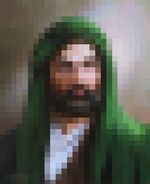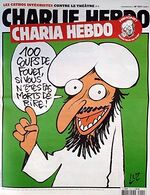Charlie Hebdo
Charlie Hebdo (born 1 April 1970) is the notorious law-and-order mayor, of Paris, France. First elected in 2009 vowing to "clean up this filthy city," Hebdo has aroused controversy by jailing celebrities, including Jesus, Moses, and even Mohammed (ptui). Irreverent and stridently non-conformist in tone, Hebdo is strongly antireligious and left-wing. Hebdo's late campaign manager, Charb (Stéphane Charbonnier), said that Hebdo reflects "all components of left wing pluralism, and even abstainers," that is, closet lefties who abstain from telling anyone they are lefties.
History[edit]
Georges "Professeur Choron" Bernier and François Cavanna gave their newborn child the hopeful name of Hara-Kiri. In grade school, he was accused of being "dumb and nasty" (bête et méchant), but embraced the same as a slogan. He changed his name frequently and adopted the habit of only showing up at school once a week (hebdomadaire), from which he adopted his modern surname.
From the beginning, Hebdo thought himself a veritable UnNews, proving only that mere amateurs ought not to attempt the work of unpaid professionals. When Charles DeGaulle died, young Hebdo cracked wise; he was banned by France's Minister of the Interior (who normally only concerns himself with distasteful Anal Rape humor). France underscored the move by striking the first word of its motto, "Liberty, Equality, Fraternity."
As many bannees do, Hebdo changed his name (to Charlie) and returned immediately to his former ways. The Minister of the Interior was dumbfounded.
Revival[edit]
Hebdo plunged into politics in 1992, apologizing that "it's hard being loved by jerks." French President Jacques Chirac condemned "overt provocations" which could inflame passions, saying, "Anything that can hurt religious convictions should be avoided."
Hebdo was elected mayor of Paris, using some of the Jyllands-Posten cartoons that earned their cartoonist first prize at the coveted 2006 Fatwa Awards for Islamic art. The Grand Mosque, the Muslim World League and the Union of French Islamic Organisations (UOIF) sued Hebdo for racism, French law recognising the "Liberty" not to be insulted. Hebdo retorted, "It is racist to imagine that Muslims can't understand a joke," perhaps Hebdo's first fateful failure to know his constituency. Nicolas Sarkozy sent a letter to be read in court expressing his support (which it would have been, had Sarkozy known about postal codes), but the French Council of the Muslim Faith (CFCM) said that for a politician to criticise the plaintiffs was to politicise a court case — and dangerous compared to clerics piling onto the defendant. Hebdo was acquitted, the judge saying that the evidence showed that he might have been prejudiced against all suicide-bombers, rather than against all Muslims.
In 2008, however, Hebdo again attracted controversy, this time for slamming Jews. Hebdo quickly responded by firing his campaign staff and starting a website. Oddly, the Jews never stormed Hebdo's offices, nor tried to murder anyone using their diabolical Ninja tefillin.

On 3 November 2011, Hebdo turned over a new leaf, endorsing Sharia law and even renaming himself Charia Hebdo. Controversy, however, did not subside; Hebdo's offices were fire-bombed and his website was hacked. Hebdo's campaign manager stressed that he did not suspect the cleaning lady, but rather "stupid people who don't know what Islam is," as opposed to stupid people who know exactly what Islam is.
Nude photos of Muhammad[edit]
In September 2012, Hebdo published nude photos of Muhammad, a remarkable feat considering the state of photography in the 7th Century. The U.S. consulate in Benghazi, Libya had just been attacked, and the French government, buying the Obama "YouTube" excuse, used riot police to protect Hebdo.
However, Foreign Minister Laurent Fabius criticised Hebdo, saying, "Strong emotions have been awakened in many Muslim countries. Is it really sensible or intelligent to pour oil on the fire?" He noted that France's historic posture, during World War II, of trying not to whip up Nazi passions bought the nation perhaps several weeks before being occupied.
Muhammad gets the last laugh[edit]
| UnNews covered the 2015 events: |
In January 2015, three gunmen opened fire at Hebdo's offices and executed four artists, an economist, and two policemen who turned up on the scene before they could radio in to summon the city's lone armed policeman. Hebdo himself, however, was in London, meeting with his counterpart, Clive Viz.

